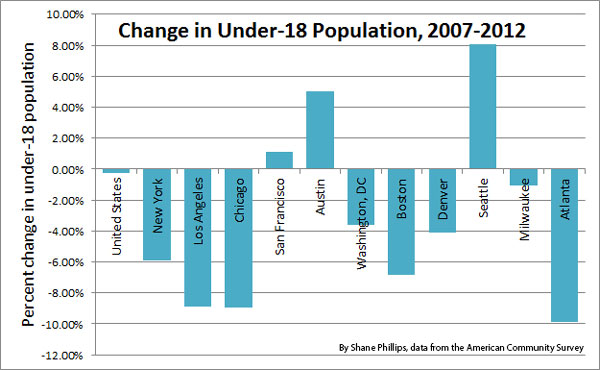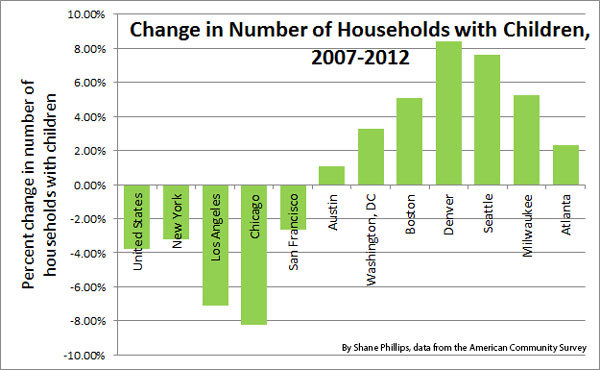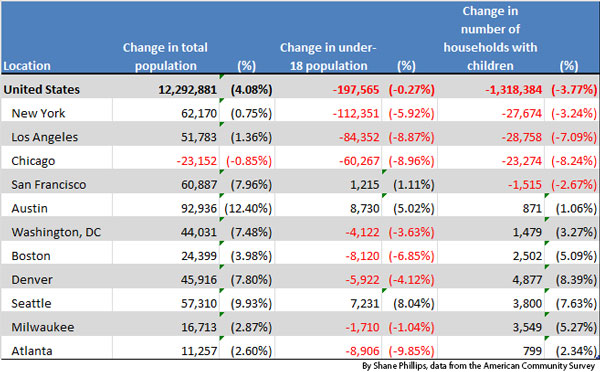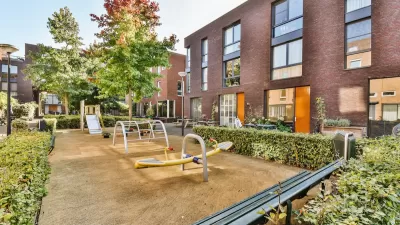While there's no denying the fact that the number of children in many American cities has declined, it's untrue that urban life is incompatible with raising a family, or that families in cities are being replaced by singles and childless couples.
As cities race to attract urban Millennials and empty-nesters — flooding the market with small apartments, approving dozens of new restaurants and bars in every neighborhood, and building streetcars, bike lanes, and pedestrian plazas — families are being pushed out or left behind. Cities are rapidly changing and, these days, they're just not any good for raising kids.
...Right?
Famed city-haters like Joel Kotkin would certainly like you to believe this is the case, and here at Planetizen Michael Lewyn recently asked if Washington, DC was a childless city (his conclusion: it's not). Fortunately for the Kotkins of the world, there's plenty of cherry-picked data out there to support the conclusion that cities really are no place for children. Take this graph of the change in the under-18 population of various cities, for example:

As you can see, the national under-18 population fell very slightly between 2007 and 2012, but look at those cities! Huge declines! All those children and their parents must be leaving to the greener pastures of blissful suburbia, where parking is free and politicians still appreciate families. We've made cities unlivable for families, either for a lack of open space, excessive congestion, or because we keep tearing down their homes to build apartment towers and mixed-use monstrosities! Oh, and bike lanes!
But while there's no denying the fact that the number of children in many American cities has declined, it's simply untrue that urban life is incompatible with raising a family, or that families in cities are being replaced by singles and childless couples. In fact, the number of households with children has increased in many of these cities, even as the United States as a whole has seen a decline in such households:

Even among the above cities where the number of households with children declined, New York and San Francisco still saw smaller declines than the national average of -3.77%. Only Chicago and Los Angeles experienced declines greater than the US average. And there's no apparent connection between density and family appeal: New York saw half the decline of Los Angeles despite having triple the density; Boston, almost five times as dense as Austin, experienced a much larger increase in households with children. Even Washington, DC, the childless city itself, actually has more families living in it now than it did five years ago.
So no, families generally aren't leaving cities, they're just getting smaller. Many cities continue to attract more families as they grow, but those families are trending toward fewer children on average — low-car leads to low-kid, it seems. Of the cities sampled above, only Chicago and Austin saw increases in average family size (of 1.43% and 2.51%, respectively). The demographics of cities have changed, but just look at the cost of housing if you've any doubt about their appeal.
None of which is to say that these changes don't carry the potential for negative consequences, or that some families aren't getting squeezed by the evolution of American cities. Even with more families in cities, a larger number of children may be growing up in the suburbs, which means less economic mobility, poorer health, and restricted freedom of movement with increased dependence on parents to get from place to place. There remain serious issues with the decreasing affordability of cities, and they're likely to be especially severe for larger families. These and other concerns deserve our attention, but with an honest recognition that urban regions remain an attractive option for many families, and that they continue to flock to many of our fastest-growing cities.
Table with additional data below. Feel free to email me or ask on Twitter if you'd like help getting data for your own city:


Alabama: Trump Terminates Settlements for Black Communities Harmed By Raw Sewage
Trump deemed the landmark civil rights agreement “illegal DEI and environmental justice policy.”

Planetizen Federal Action Tracker
A weekly monitor of how Trump’s orders and actions are impacting planners and planning in America.

The 120 Year Old Tiny Home Villages That Sheltered San Francisco’s Earthquake Refugees
More than a century ago, San Francisco mobilized to house thousands of residents displaced by the 1906 earthquake. Could their strategy offer a model for the present?

Opinion: California’s SB 79 Would Improve Housing Affordability and Transit Access
A proposed bill would legalize transit-oriented development statewide.

Record Temperatures Prompt Push for Environmental Justice Bills
Nevada legislators are proposing laws that would mandate heat mitigation measures to protect residents from the impacts of extreme heat.

Downtown Pittsburgh Set to Gain 1,300 New Housing Units
Pittsburgh’s office buildings, many of which date back to the early 20th century, are prime candidates for conversion to housing.
Urban Design for Planners 1: Software Tools
This six-course series explores essential urban design concepts using open source software and equips planners with the tools they need to participate fully in the urban design process.
Planning for Universal Design
Learn the tools for implementing Universal Design in planning regulations.
Clanton & Associates, Inc.
Jessamine County Fiscal Court
Institute for Housing and Urban Development Studies (IHS)
City of Grandview
Harvard GSD Executive Education
Toledo-Lucas County Plan Commissions
Salt Lake City
NYU Wagner Graduate School of Public Service






























